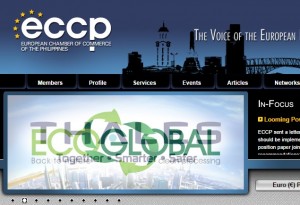Red tape continues to drag down PH, say EU businessmen
Red tape remains pervasive in the Philippines, according to European businessmen, who have renewed calls for the government to streamline the business registration process for foreign investors.
“The documentary requirements for registration and doing business by foreigners here in the country need to be streamlined. The pervasive bureaucratic red tape persists to discourage and ward off potential investors,” said Henry J. Schumacher, European Chamber of Commerce of the Philippines (ECCP) vice president for external affairs.
“Weeding through the layers of requirements in starting up a business is often attended by bureaucratic red tape, inconsistent, complex and lengthy procedures, delays and a high cost for regulatory processes,” Schumacher said in an Aug. 18 letter to Sen. Joseph Victor G. Ejercito, chair of the Senate committee on economic affairs.
For instance, the ECCP official said, an investing firm must first secure as much as 162 permits, as well as signatures of concerned government officials, if it wants to put up a power plant.
“This bureaucratic pathology has no social redeeming value and is only centered on rules, regulations and procedure that entail compliance burden on new entrants and businesses,” the group said.
Citing a recent Philippine Institute for Development Studies (PIDS) study authored by Trade Assistant Secretary Rafaelita M. Aldaba, the group pointed out that the country is lagging behind its Association of Southeast Asian Nations (Asean) peers in generating foreign direct investment (FDI) due to, among others, “lengthy procedures, slow processing and delays, lack of transparency in procedure, [and] corruption.”
These are on top of “policy inconsistencies, [and] lack of streamlining of interrelated procedures,” it added.
The study also revealed even the state-run investment promotion agencies (IPAs) acknowledged that the slow FDI inflows were caused by delays in the issuance of permits from both local government units (LGUs) and national government agencies. It may take up to 120 days to secure permits, according to the study.
The “slow” process is not limited to the registration of businesses—even investors’ availment of fiscal and other incentives from the government takes time, the ECCP said.
Although the grant of incentives “appears to be non-discriminatory, the application process is complicated, and incentives can only be finally granted by [the Board of Investments] after a favorable evaluation and approval of other agencies like the Department of Finance and the Bureau of Customs,” the group noted.
Also, ECCP said investor protection in the Philippines remained weak in terms of dispute resolution.
Judicial dispute resolution “takes years. Moreover, courts are known to promulgate decisions with varying interpretations on laws, thereby changing generally accepted rules at the time the investment was made. This apparent uncertainty and lack of stability renders the investor vulnerable, [with] a high risk of losing his investment,” the group said.

